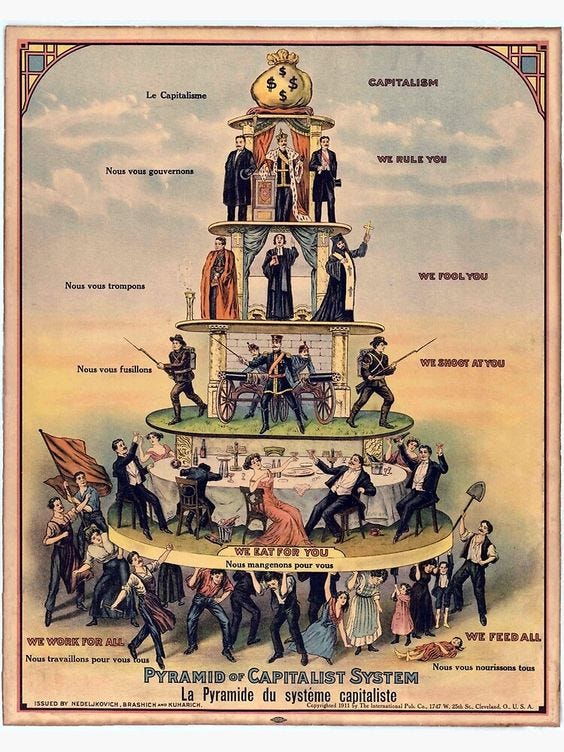Divisiveness: the Great Prevarication
We’re told that the goal must always be to “see the other side” but what does this actually mean?

we’re told that the goal must always be to “see the other side” but what does this actually mean?
As we come to the close of the 2020 election cycle with the nomination of President-Elect Joe Biden, many are celebrating the first bit of hope they’ve had in an increasingly difficult year. But for those on the Progressive left, hope is also a cause for concern — because hope can lead to complacency. Because so many people are desperate for a “return to normal” without really understanding what “normal” is and why it’s accepted as such. If things return to normal, the immense problems underlying the global society will continue to ferment like old yogurt until a point of dangerous critical mass is reached and things turn from bad to much, much worse.
At the same time, others from within the US Democrat political party are concerned for another reason: if the Progressives continue to dig in their heels about things like the environment, medicare for all, universal basic income, and “taxing the rich” it will alienate the people in the so-called “center” of the political sphere — and, more importantly, alienate the powerful private interests that fund the Democrats each election cycle.
For Progressives, the rhetoric from the inner-party pundits is expected and yet deeply frustrating, not merely because it’s divisiveness is exactly what the inner-party says the Progressives are responsible for, but because it detracts from the broader coalition that the party needs if it is going to take on the 71-million strong voting coalition which backed President Trump this year. While the Republican party has managed to coalesce around very specific ideals (or at least, the vague idea that there even are ideals) the Democrats are being tugged like a man being drawn and quartered. But while the inner-party Democrats cast aspersions toward the Progressives and court the interests of the wealthy minority and the Republican moderate fringe, the progressives are actually out there winning elections.
That’s where the focus needs to be, say Progressive leaders: winning local, State, and National positions. Changing policies at the fundamental level and organizing the sort of grass-roots campaign that got the “GOP” into such an entrenched position of power in the first place. There will always be loud fringe voices shouting “I’ll never vote for that person!” and claiming to be the main voice of the team, but once you dig past those outspoken Progressives who are rhetoricians themselves, you find a powerful core movement dedicated to intelligent politics and reliable social change. What’s even more fascinating is the positions championed by these Progressive voices:
- Healthcare as a human right.
- A living income as a human right.
- Equality as a human right.
- Religious freedom as a human right.
- A safe environment as a human right.
- Lower crime.
- Addiction as a health crisis.
- Industrial revitalization through 21st century technology.
All of the things, in fact, that were championed during the early parts of the 20th century, when the idea of American exceptionalism gave rise to a belief in a shining future where freedom and dignity were the hallmarks of our people.

The question then becomes: if the ideas labeled as so-called “Progressive talking points” become revealed as practical necessity and longstanding American tradition, why are they being derided so? Why are any politicians fighting these ideas, and fighting them with such passion?
The answer can be found in a specific Californian law which failed on the ballot this November.
In November of 2020, Californian voters resoundingly sounded their support for Proposition 22, a bill backed but hundreds of millions of dollars in corporate funding. The reason for the expenditures on the part of Uber and Lyft is not difficult to ascertain: winning this fight would pave the way for much larger gains down the road, while losing would remove the ability of these mega-corporations to profit off the servile rates they offer to their millions of contract-workers.
This is the same reason why heavy pushback has continued against California’s attempts at increasing access to cheap and reliable public transit. The major corporations cannot function with impunity if there are public options available. In order to do what they do, they require that people surrender their human rights. Which is what the Progressives who championed Proposition ultimately knew they were fighting for: not a single battle, but the idea of what “human rights” actually mean.
Corporate interests eroding the public good is not new. Following World War Two, massive investments in local infrastructure were being made — and corporations saw the risk if those investments were allowed to go into public and local systems. Massive advertising campaigns, like the one shown below, simultaneously promoted the values of an enlightened technological future, while deriding the efforts of public-owned utilities. “Why bother putting all that money into public utilities when private ones are already doing such a grand job?” was the popular saying.

What the voting public misunderstood about Proposition 22 is that the battle being waged by the large corporate interests is not small-scale (and, yes, 1.2 million workers is “small scale” to these companies). The corporate interest relies upon a far more fundamental and insidious victory being made: nothing less than the sheer alteration of “normal” to suit their own private interests. This, of course, is only one such fight in a long line of recent corporate victories — the most dangerous of which is the “Citizens United” ruling which cemented the idea that corporations deserve the same rights and people (and infinitely more rights than any aspect of the natural environment).
A frequent GOP talking point is that the country is “losing its moral fabric.” There’s a pervasive idea within certain circles that the United States no longer has a cohesive sense of itself, no longer cares about families, no longer champions the working man.
Interestingly, these might very well be things that the Progressive leaders are likely to say as well — which may explain why so many traditionally “Progressive” perspectives are doing better than “Moderate” options in communities with traditionally-strong conservative support. Perhaps the only wording not often found within the Progressive caucus is “immoral” which might be because of how slippery that term is and how easily it is to fall back upon that word without understanding the subtext behind it. And yet there is an immoral movement within the United States — it just doesn’t have anything at all to do with immigrants, minorities, or the Progressives who want better public train systems.
The immoral factor is the greed perpetrated so cleverly by large corporate interests (and certain monied individuals who rely upon the suppression of public options in order to maintain their personal power).

The most immoral thing happening in our country is the continued betrayal of the American Dream by those with invested interest in maintaining their power over the rest of us. Power that comes at the expense of community, family, strong education, fair governance, and the freedom to live a decent life without threat and fear.
Which returns us to the central point of the topic at hand: the prevarication of “divisiveness” as applied to the Progressive movement.
Prevarication is another way of saying “untruthful” but it means something else as well: “evasive”. Recently, Kamala Harris sat down with Medicare for All activist Ady Barkan. Ady delivered powerful and probing questions regarding Harris’s personal beliefs around Medicare for All and strong community cooperation, but Harris slipped into rhetorical evasiveness at every turn. What she ended up saying amounted to very little, and certainly offered no hint at a strong promise of support for Medicare for All.
The same evasiveness seen in that interview remains a constant within the Democratic inner-party and across the board with Democratic pundits within the media. When asked a question, they respond with a question, or else they answer a question completely different than the one that was asked; it’s not a nefarious rhetorical technique in and of itself, but it does become dangerous when applied at the same time as overt attacks against the Progressive leaders within their own party. In other words: it’s one thing to ignore questions that are intended to sidetrack from an important central point, and quite another to ignore questions that a growing number of Americans want discussed and answered by their elected officials. And it’s something altogether different when, instead of answers, condemnations against those asking the questions are highlighted at every turn.
One of the central evasions made during the 2020 campaign was the appeal to a greater “evil” waiting in the wings: “Stop fighting the central party,” went the rhetoric, “because there are tyrants around every corner.” Of course, President Trump proved repeatedly that he did, indeed, embody all the grand characteristics of tyrants and petty autocrats. But his party’s leadership, as a whole, also proved that it supported his fascistic tendencies, and thereby displaced even further the myth that they were in any way, shape, or form, beholden to the central ideals of America. No “Grand Old Party” like a fascist party.
But the response by inner-party Democrats baffled so many on the Progressive front because it amounted to “let’s make friends with as many of these budding fascists as possible while at the same time pointing out how dangerously tyrannical they are.” The Democratic leadership swung its sword of rhetoric everywhere — from Russia to its own Progressive heart — without paying any attention to the damage that its flailing caused. Or that is how it seemed.
But the problem was not merely one of ineffectual leadership, but one of mixed-motives and dangerous allegiances. Ultimately, the elite of the Democratic party did not want the fundamental recovery of American idealism because such a recovery would damage the very industries upon which those of the inner-party rely for their privilege and power.
Not that all of them would say as much themselves; it’s generally more likely that people who are trying to do something good are simply mislead than actually conspiratorial. But, all the same, the outcome remains one of appeasing the far-right at the expensive of the expanding Progressive left. The only problem is that in order for the Democrats to maintain any sort of lead, they need the full support of the Progressive movement within their midst — a movement which has shown itself to be the strongest engine of political power within the party.
Ultimately, while the inner-party Democrats continue to attack the people responsible for gaining them victories, the Progressives have already set their sights on the most intense battlefield for the identity of America to-date: the midterm elections of 2022. In 2018 the “blue wave” that Democratic pundits hoped for barely turned out a “blue trickle” and Republicans maintain (and expanded) control of key sections of the government. If that happens again in 2022, the future of the United States looks very bleak indeed. The best hope for it not to happen? The powerful Progressive caucus leading the charge into those States typically derided and overlooked by the inner-party Democratic leadership, States which are showing themselves to actually have a deep well of support for traditional American values after all: Values which will make “Medicare for All” just the beginning.
